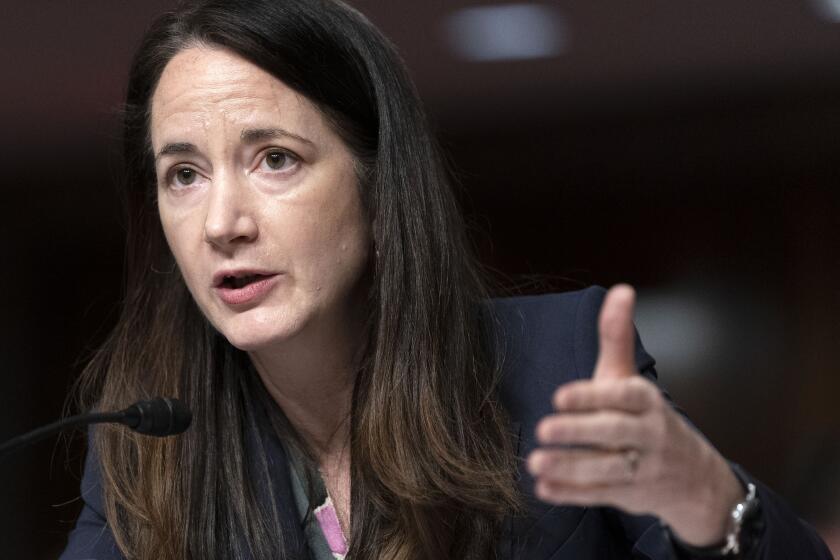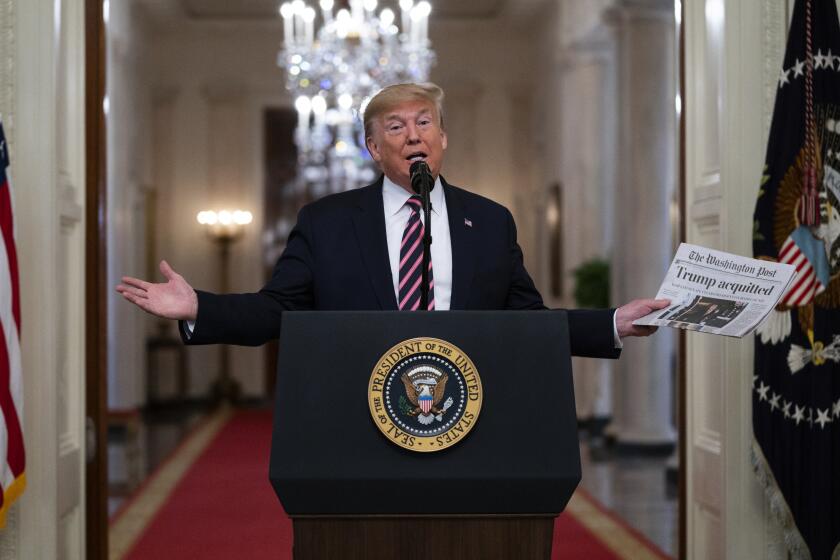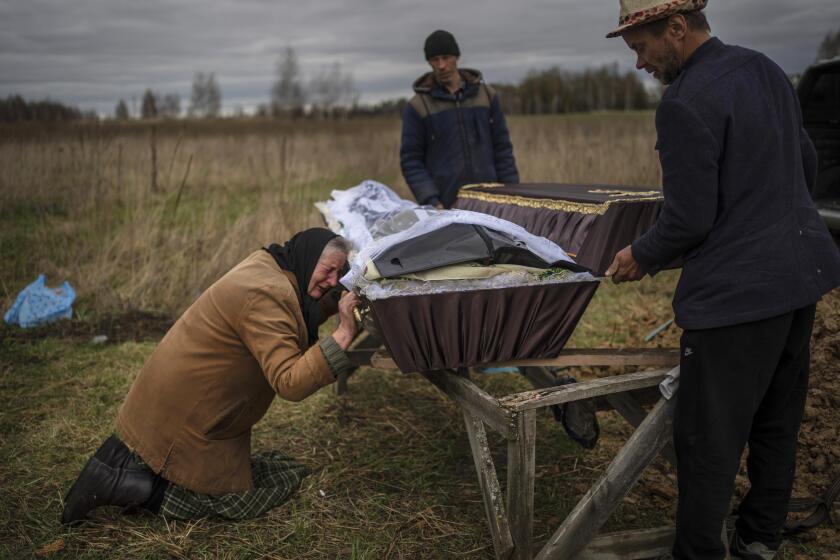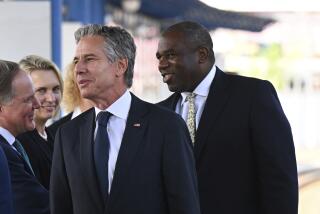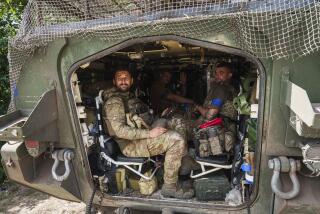Britain says its high-tech missile system can help Ukraine push back Russia
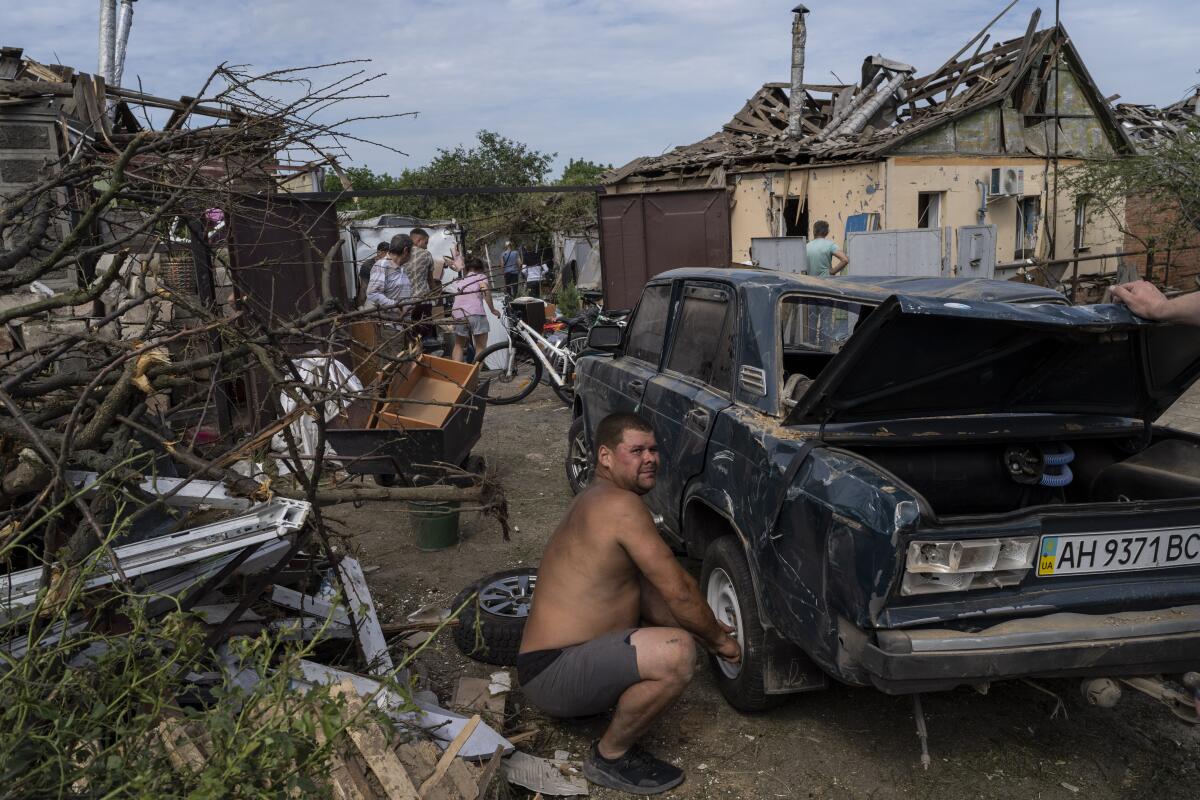
- Share via
KYIV, Ukraine — The British government said Monday that the multiple-launch rocket systems it is offering to Ukraine will bring “a significant boost in capability” for the country’s efforts to resist Russia’s invasion.
“If the international community continues its support, I believe Ukraine can win” its war against Russia, British Defense Secretary Ben Wallace said in a statement.
The statement came after comments Sunday by Russian President Vladimir Putin, who warned the West against sending longer-range rocket systems to Ukraine.
The British government described the M270 weapon system as a “cutting edge” military asset that can strike targets up to 50 miles away “with pinpoint accuracy.” Britain pledged last week to send the weapons but gave no details about delivery dates.
The U.S. last week announced plans to deliver $700 million in security assistance for Ukraine, including four precision-guided, medium-range rocket systems, as well as helicopters, Javelin antitank systems, radars, tactical vehicles and more.
Washington and London hope that the deliveries will help Ukraine turn the tide of the war in its eastern Donbas region, which Russia appears intent on capturing entirely.
U.S. intelligence agencies have begun a review of how they judge the will and ability of foreign governments to fight.
They are unlikely to have an immediate effect, however. The Pentagon said last week that it would take at least three weeks to get the U.S. weapons onto the battlefield. Russia-backed separatists have fought the Ukrainian government since 2014 in the Donbas.
The U.S. has stopped short of offering Ukraine longer-range weapons that could fire deep into Russia and inflame Washington’s tensions with Moscow.
Russian Foreign Minister Sergei Lavrov warned the West that, if it provided Ukraine with long-range rockets, Moscow would respond by taking over larger areas of Ukraine.
Speaking during an online news conference Monday, Lavrov said that “the longer the range of weapons you supply, the farther away the line from where neo-Nazis could threaten the Russian Federation will be pushed.” Moscow says it’s fighting against neo-Nazis in Ukraine — a false claim derided by Ukrainian President Volodymyr Zelensky, who is Jewish and lost relatives in the Holocaust.
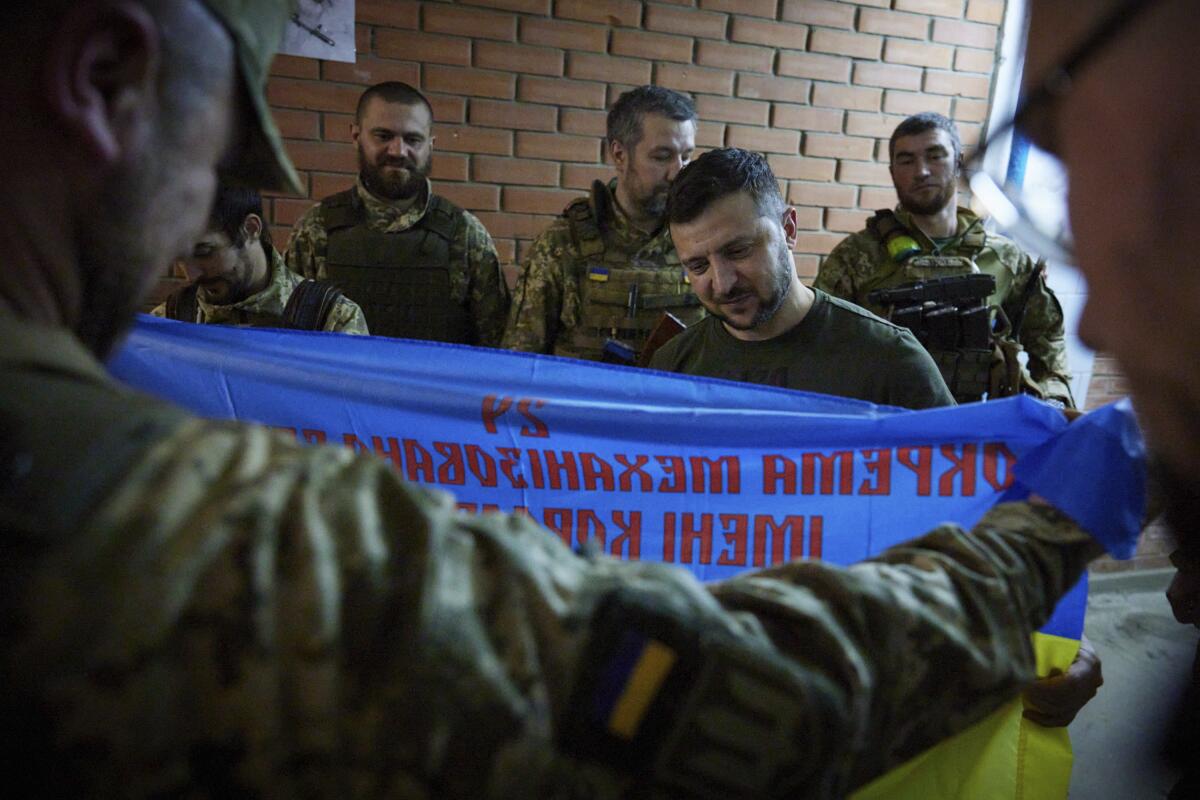
Ukraine’s struggle was at the forefront of comments by U.S. Chairman of the Joint Chiefs of Staff Mark A. Milley and was in the minds of World War II veterans of D-Day who gathered in Normandy in northern France on Monday.
“The fight in Ukraine is about honoring these veterans of World War II,” Milley said at the American Cemetery of Colleville-sur-Mer, overlooking Omaha Beach.
“It’s about maintaining the so-called global rules-based international order that was established by the dead who are buried here at this cemetery,” he said.
American D-Day veteran Charles Shay, 97, was at Omaha Beach in Normandy to mark the 78th anniversary of the June 6, 1944, landings that ultimately resulted in the liberation of Europe from Nazi domination.
Even defense hawks in the GOP stood virtually united by then-President Trump’s side when he was impeached in 2019 after pressuring Ukraine’s leader for “a favor.”
Asked about his feelings regarding a new war being waged on the Continent, Shay called it “a very sad situation.”
“In 1944, I landed on these beaches and we thought we’d bring peace to the world. But it’s not possible,” he added with regret.
Lavrov attacked the refusal to let his plane fly into Serbia on Sunday as “cynical” and “unthinkable.” Reports said that Serbia’s neighbors, Bulgaria, North Macedonia and Montenegro, had refused to allow Lavrov’s plane to fly through their airspace to reach Serbia.
“A sovereign state has been deprived of its right to conduct foreign policies,” he said.
He blamed NATO allies — with whom Moscow is at loggerheads — for engineering the flight ban, saying it revealed that the main purpose of the alliance’s expansion is to try to isolate Russia.
Numbers help tell the tale of the death, destruction and economic havoc caused by Europe’s worst armed conflict in decades.
Russia’s own use of missiles in Ukraine, meanwhile, continued to pummel targets, with the Russian military claiming Monday that it had struck a Ukrainian factory involved in repairing armored vehicles.
Russian warplanes fired long-range missiles to destroy the plant on the edge of the town of Lozova in the northeastern Kharkiv region, Russian Defense Ministry spokesman Maj. Gen. Igor Konashenkov said.
Russian aircraft hit 73 areas of concentration of Ukrainian troops and equipment, while the Russian artillery struck 431 military targets, Konashenkov said. His claims couldn’t be independently verified.
Putin vowed to strike deeper into the heart of Ukraine if the West sends Kyiv longer-range missile systems. In a show of force, Russian missiles struck Ukraine’s capital, Kyiv, on Sunday.
Breaking News
Get breaking news, investigations, analysis and more signature journalism from the Los Angeles Times in your inbox.
You may occasionally receive promotional content from the Los Angeles Times.
Ukraine’s General Staff said Russian forces fired five X-22 cruise missiles from the Caspian Sea toward Kyiv, and one was destroyed by air defenses. Four other missiles hit “infrastructure facilities,” but Ukraine said there were no casualties.
Before Sunday’s early-morning attack, Kyiv hadn’t faced any such Russian airstrikes since the April 28 visit of United Nations Secretary-General Antonio Guterres.
Zelensky on Sunday visited command posts and the front line positions of Ukrainian troops in the Donetsk and Luhansk regions, which make up the Donbas.
A Ukrainian regional governor said Monday that the situation in a key eastern town has worsened for defending troops.
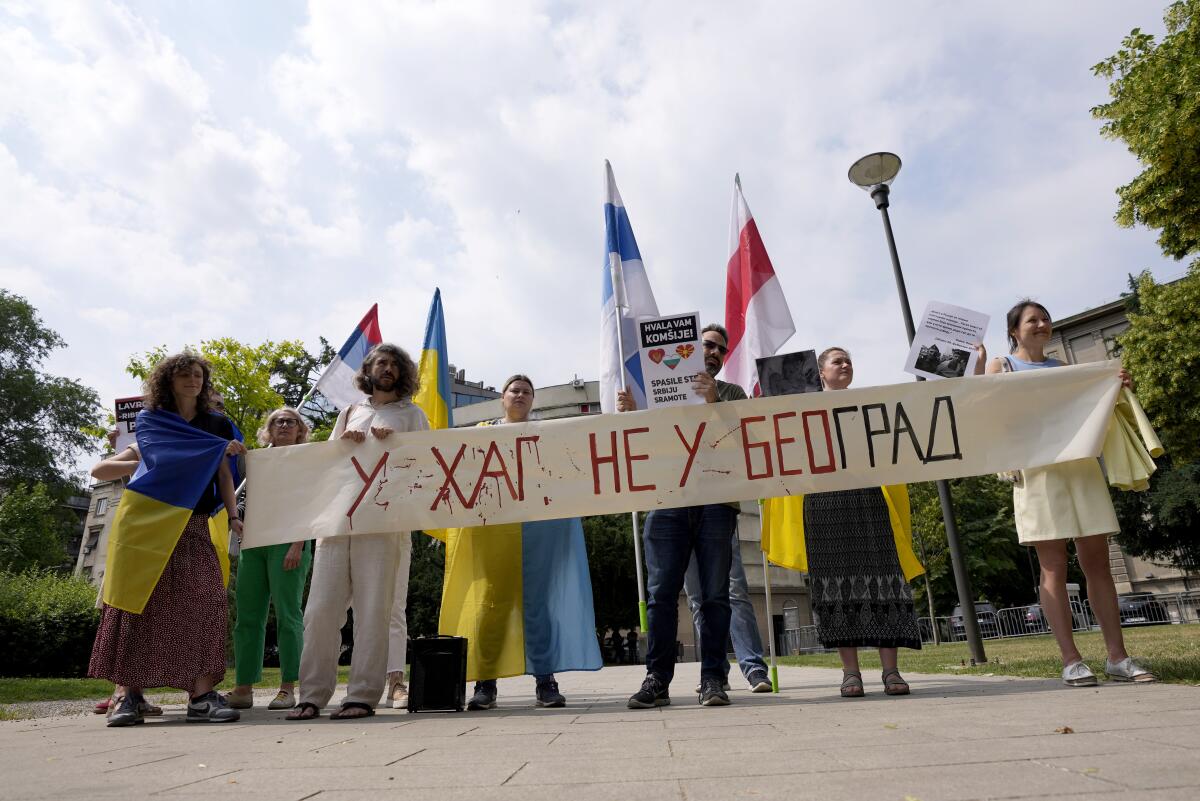
Luhansk Gov. Serhiy Haidai said Monday that fierce fighting was continuing in the city of Severodonetsk, which is at the epicenter of the Russian offensive.
He described the combat situation as “quite dynamic,” adding that Ukrainian forces had lost some of the gains they made over the weekend but were holding their positions in the city’s industrial zone.
“Our defenders managed to conduct a counteroffensive and free nearly half of the city, but the situation has worsened again now,” Haidai told the Associated Press.
“The shelling of Severodonetsk has intensified — [the Russians] are destroying everything in line with their scorched-earth tactics,” he said.
A Ukrainian couple have turned their farm into a sanctuary for all sorts of animals left behind during the war — and for some of their owners as well.
The Russians “have an enormous amount of equipment and personnel. They have pulled up a lot of reserves,” he added.
Russian forces have been focusing on the capture of the two cities of Severodonetsk and Lysychansk along the banks of the strategic Seversky Donets River.
West of those cities, in the towns of Slovyansk and Bakhmut, cars and military vehicles have been speeding into town from the direction of the front line. Dozens of military doctors and paramedic ambulances worked Sunday to evacuate civilians and Ukrainian servicemen, many of whom had been hurt by artillery shelling.
Western military intelligence reports say Ukrainian counterattacks in Severodonetsk are probably halting the operational momentum Russian forces previously gained by concentrating their combat units and firepower in the area.
More to Read
Sign up for Essential California
The most important California stories and recommendations in your inbox every morning.
You may occasionally receive promotional content from the Los Angeles Times.
